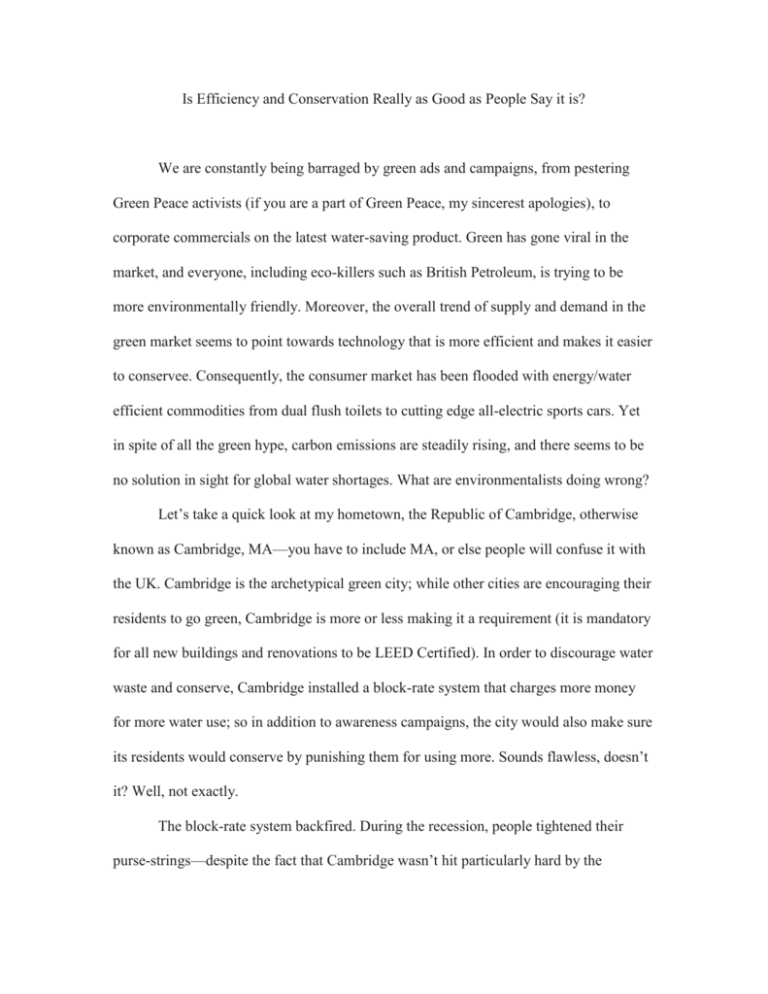Is Efficiency and Conservation Really as Good as People Say it is
advertisement

Is Efficiency and Conservation Really as Good as People Say it is? We are constantly being barraged by green ads and campaigns, from pestering Green Peace activists (if you are a part of Green Peace, my sincerest apologies), to corporate commercials on the latest water-saving product. Green has gone viral in the market, and everyone, including eco-killers such as British Petroleum, is trying to be more environmentally friendly. Moreover, the overall trend of supply and demand in the green market seems to point towards technology that is more efficient and makes it easier to conservee. Consequently, the consumer market has been flooded with energy/water efficient commodities from dual flush toilets to cutting edge all-electric sports cars. Yet in spite of all the green hype, carbon emissions are steadily rising, and there seems to be no solution in sight for global water shortages. What are environmentalists doing wrong? Let’s take a quick look at my hometown, the Republic of Cambridge, otherwise known as Cambridge, MA—you have to include MA, or else people will confuse it with the UK. Cambridge is the archetypical green city; while other cities are encouraging their residents to go green, Cambridge is more or less making it a requirement (it is mandatory for all new buildings and renovations to be LEED Certified). In order to discourage water waste and conserve, Cambridge installed a block-rate system that charges more money for more water use; so in addition to awareness campaigns, the city would also make sure its residents would conserve by punishing them for using more. Sounds flawless, doesn’t it? Well, not exactly. The block-rate system backfired. During the recession, people tightened their purse-strings—despite the fact that Cambridge wasn’t hit particularly hard by the recession—and spent much less money on commodities, including water; consequently, water demand dropped by 4% in 2009, thereby achieving the city’s goal for water conservation. However, the city did not reward residents for using less, in fact it did the exact opposite by punishing them with higher rates: For the 2010 fiscal year, the Cambridge Water Works increased water rates by 1.8% and sewer rates by nearly 8 %! You must be wondering, why the heck would people conserve water if they had to pay more? Economically speaking, the Water Works’ response made a lot of sense; water management is generally a not for-profit business, and managers tend to struggle in order to raise enough revenue to cover operating costs. When users conserve, water managers have no choice but to charge more in order to break even. On the other hand, when residents use more water than they need too, the Water Works is happy because it collects enough revenue to cover costs. As a result, it rewards its customers them by lowering rates. In fact, for this fiscal year, the Water Works decided to increase both water and sewer rates by 0.0% since water use was high during the last fiscal year. If that it is not bad enough, the block rate system I mentioned earlier is also a conservationists’ worst nightmare. The difference between blocks in terms of price is approximately $0.18 to about $0.36; in terms of water, its tens of thousands of gallons— wow. While water rates increase for heavy users, the rates are so low that one wonders if the block rate system actually accomplishes anything in the first place! Compound that with the fact that rates will go up if you conserve and you have yourself a really big problem. Furthermore, when comparing the actual rates with my peers’ water suppliers, I came to the conclusion that Cambridge undercharges it residents by a significant margin. In fact, my relatives in Algeria pay much more than I do for water of a much poorer quality! Suffice it to say that despite all its best efforts, Cambridge is not making the best use of its water, and it is as guilty as the next guy of treating water like a cheap expendable commodity. The question is, why? After all, Cambridge is….well, you know….Cambridge! If Cambridge of all cities can’t manage its water, then who can? Why is it that, in spite of all the awareness and conservation efforts, Cambridge has failed to deliver? I see the problem of water mismanagement stem from two things: Water’s near worthless value and a lack of incentive to conserve. In order to better understand the plight of water, let’s look at another commodity which is as abundant as water and used by everyone on a frequent basis: Electricity. Like water, electricity is a cheap commodity that is wasted recklessly; moreover the emergence of energy efficient technologies in the consumer market only gave people more of an incentive to waste energy. In short, efficiency and conservation did neither the consumers nor the environment any good. However, unlike water, electricity has a relatively high value, high enough to allow distributors like General Electric to rake in billions in revenue every year, and high enough to allow strategists to find a way around Jevon’s Paradox. In the past decade or so, researchers explored ways to take efficiency a step further by introducing a new industry, demand response. Demand response is pretty straightforward: Energy users reduce demand during peak energy production, thereby relieving stress on the power grid, allowing energy companies to make money and not lose money; as a reward, energy companies give customers monetary compensation. Demand response provide a solution to Jevon’s paradox, since consumers can use energy efficient technology to curb their energy use; moreover, they are incentivized to reduce their consumption by getting paid to do so and get penalized if they don’t. A similar demand response solution is available for water. However, unlike with electricity, we have to go two steps in order to ensure conservation. Demand response works only because electricity has a value, and that is precisely the problem with water— it has no value. So before exploring a similar demand response approach to the water market, we must first ensure that water is worth something saving for. People need incentives (usually money) in order to conserve more.



